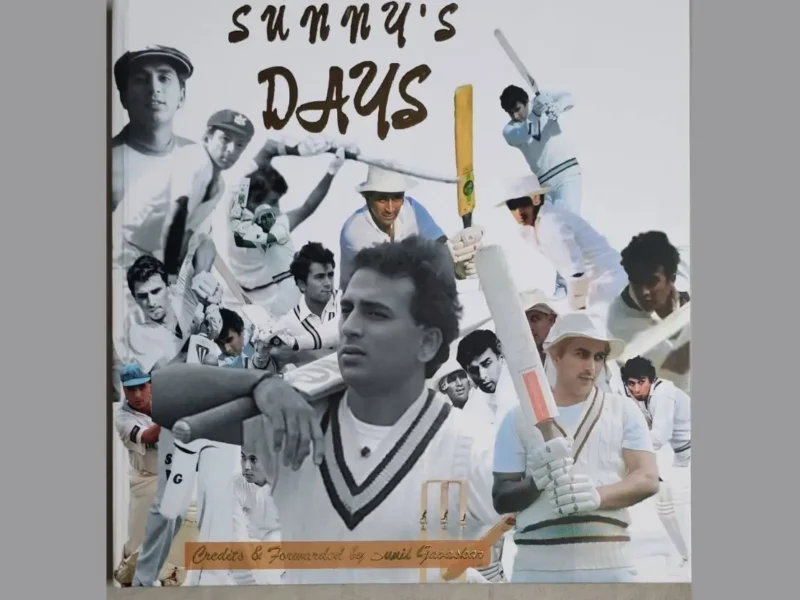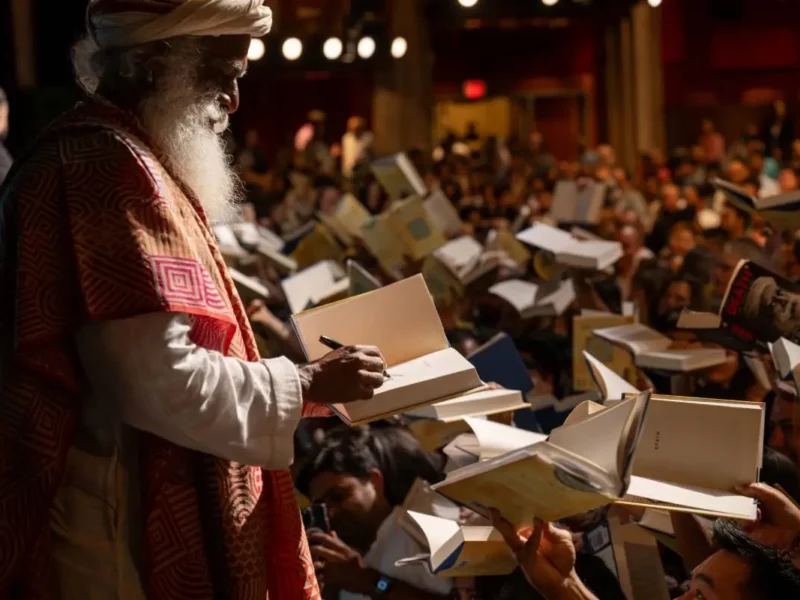
Kishore Kumar: The Entertainment Package
By VIKAS DATTA
Known primarily for his gifted, effortless, and vibrant singing, he was a complete entertainment package in Hindi films — being also an accomplished actor, lyricist, composer, producer, director, screenwriter — and both on and off screen, its biggest eccentric.
From “Khwab ho tum ya koi haqeeqat” to “Pal pal dil ke paas”, “Zindagi ke safar mein maqam” to “Khaike paan Banaraswala”, and “Khilte hain gul yahan” to “Kya yehi pyar hai”, Kishore Kumar’s mellifluous voice still reverberates for stars from Dev Anand to Dharmendra, Rajesh Khanna to Amitabh Bachchan, and Shashi Kapoor to Sanjay Dutt, in a range of emotions, moods, and situations.
However, it goes on to eclipse his own onscreen prowess, where he could essay madcap antics of young romantic leads to restrained and sensitive essaying of more complex and nuanced characters.
Everyone has their own range of favorite songs from Kishore Kumar, born on this day (August 4) in 1929, but if you ask about his film roles, what comes usually to mind is “Chalti Ka Naam Gaadi” (1958) where he starred with his elder brothers Ashok and Anup, or his over-the-top depiction of a pan-chewing music ‘ustad’-cum-love relationship consultant in “Padosan” (1968).
But there was much more to him as an actor, as he demonstrated a flair for essaying a wide variety of roles, held his own against the likes of Dilip Kumar, Meena Kumari (“Naya Andaz”, 1956), and even Jayalalithaa (in “Man-Mauji”, 1962) and went on to inspire future generations.
While he has nearly 3,000 songs (including a duet where he sings the female side in falsetto) from 1,200 odd films, he also went on to act in about 90 films between 1946 and 1982. Why he is not as famous for them is that most of these came before 1970 or bombed at the box office.
And why he didn’t do more films is rooted in his own whimsies. Kishore Kumar was notorious for asking his servants to ward off filmmakers, biting their hand as they paid him his fees, or not turning up for work. In one case, where a director obtained a decree from the court directing him to turn up for work, he only did what he was expressly told to do. You can imagine how that would have turned out.
Let’s look at a few of Kishore Kumar’s roles.
“Naukri” (1954) – The Bimal Roy film sought to depict the dreams of Indian youth in the first decade of Independence. As Rattan, who dreams of a steady job, so he can put up his widowed mother in a proper house and get his sick sister treated, Kishore Kumar is in turn hopeful, distraught (where his appointment letter is burnt by his girlfriend’s father), heartbroken (as he finds the promised job is gone/he is too later for the appointment/a good turn backfires), putting a masterly performance as an aspirational everyman youth.
“New Delhi” (1956) – This was also another look at the new India, through the prism of its wide diversity – and with some contemporary resonances. Kishore Kumar plays Punjabi youth Anand who comes to the national capital but is unable to find lodging due to the landlords/landladies’ propensity for somebody from their own region. He impersonates a Tamilian, but the problem starts when he falls in love with Janki (Vyjayanthimala). And what happens when their parents get into the act?
“Musafir” (1957) – The directorial debut of Hrishikesh Mukherjee, the story is told through the medium of a house which hosts three sets of tenants, one after the other – and a mysterious violinist is a connecting link. While the first is a newly eloped and married couple (Suchitra Sen and Shekhar), the second is a family comprising Nazir Hussain, his widowed daughter-in-law (Nirupa Roy) and younger son (Kishore Kumar). While our hero is adept at keeping a light atmosphere, he is frustrated at not being able to find a job, which leads to words with his father and finally, a suicide bid. All, however, ends happily. The third episode with new tenants reveals the mystery of the violinist – it is Dilip Kumar, and a bittersweet ending follows.
“Dilli Ka Thug” (1958) – This was another vehicle for Kishore Kumar to display his zany histrionics. Persuaded by his mother to get a proper job, Kishore Kumar Sharma (our hero) goes to Bombay and falls in love with Asha (Nutan). However, her uncle running a factory making spurious medicines, has had a malefic influence on his life and now seeks to target him. Mayhem ensues but a diligent police inspector (Iftekhar) is on the job. The film’s songs include “C A T Cat, Cat Mane Billi, R A T Rat.” and “Hum To Mohabbat Karega”.
“Apna Haath Jagannath” (1960) – Akin to “Naukri”, this stresses the dignity of labor with Kishore Kumar playing Madan with a rare blend of tomfoolery, sensitivity and empathy. He is a fun-loving student on whom his parents have already staked much but see their hopes dashed as he can’t get a job. The usual mixture of comedy, romance and pathos follow before a happy ending for all.
“Half Ticket” (1962) – This has Kishore Kumar playing (yet another) indolent son of a millionaire but storming out of house after a spat. Short of money, he hits up on the expedient of impersonating a minor to get concession on his railway ticket but gets ensnared into the machinations of a suave diamond smuggler (Pran). The rest of the film deals with how he gets out of this sticky situation. “Cheel cheel chilla ke kajri sunaye”, with Kishore as the ‘child’ and “Aake seedhi lagi dil pe”, picturised on Pran and Kishore in drag, and featuring him singing both the male and female parts is the highlight.
“Door Gagan Ki Chaaon Mein” (1964) – In his directorial debut, Kishore Kumar is a soldier who returns home to find that his family has been killed in a fire and the only survivor is his son (played by real-life son Amit) who has become mute due to the trauma. It is a moving tale of a father-son bonding, but with the usual happy ending.
“Mr. X in Bombay” (1964) – One of Indian cinema’s earliest and accomplished sci-fi as well an example of some inspired acting from everyone from hero to villain, it has Kishore as stodgy Banarsi poet Sudarshan who goes in for a western makeover after coming to Bombay and falling in love. But then all mayhem breaks loose when his love interest’s loony scientist father invents an invisibility serum, Sudarshan drinks it, and a villain is out to get his hands on the formula. “Mere Mehboob Qayamat Hogi” is a highlight.
“Pyar Kiye Jaa” (1966) – This madcap film, based on a southern film, is best known for that comic set-piece scene between Mehmood and Om Prakash, but what gets overlooked is how Kishore Kumar impersonates his friend’s (Shashi Kapoor) father to advance his suit with the rich prospective father-in-law (Om Prakash). Confusion arises when our hero learns that Om Prakash is also the father of his love interest, and his father, a childhood friend of Om Prakash, drops in too. Kishore’s performance was replicated by Govinda in “Haseena Man Jayegi” (1999), though in his own way.
“Do Dooni Char” (1968) – Little remains known about this romantic comedy, except that it was based on Shakepeare’s “Comedy of Errors” and one of the first film-writing ventures of Gulzar, but it allows Kishore Kumar to indulge in his penchant for inspired and quirky song, as well as sing onscreen one of his best songs – “Hawaaon pe likh do, hawaoon ke naam/Hum anjan pardesion ka salaam”.




